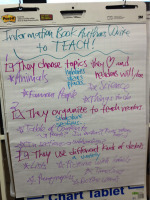I recently came across an article in Wired Magazine called "Why Kids Can't Search".
Research and publish the best content.
Get Started for FREE
Sign up with Facebook Sign up with X
I don't have a Facebook or a X account
Already have an account: Login
Supporting school leaders in helping all students become college and career-ready and to succeed in post-secondary education and training
Curated by
Mel Riddile
 Your new post is loading... Your new post is loading...
 Your new post is loading... Your new post is loading...
|
|











